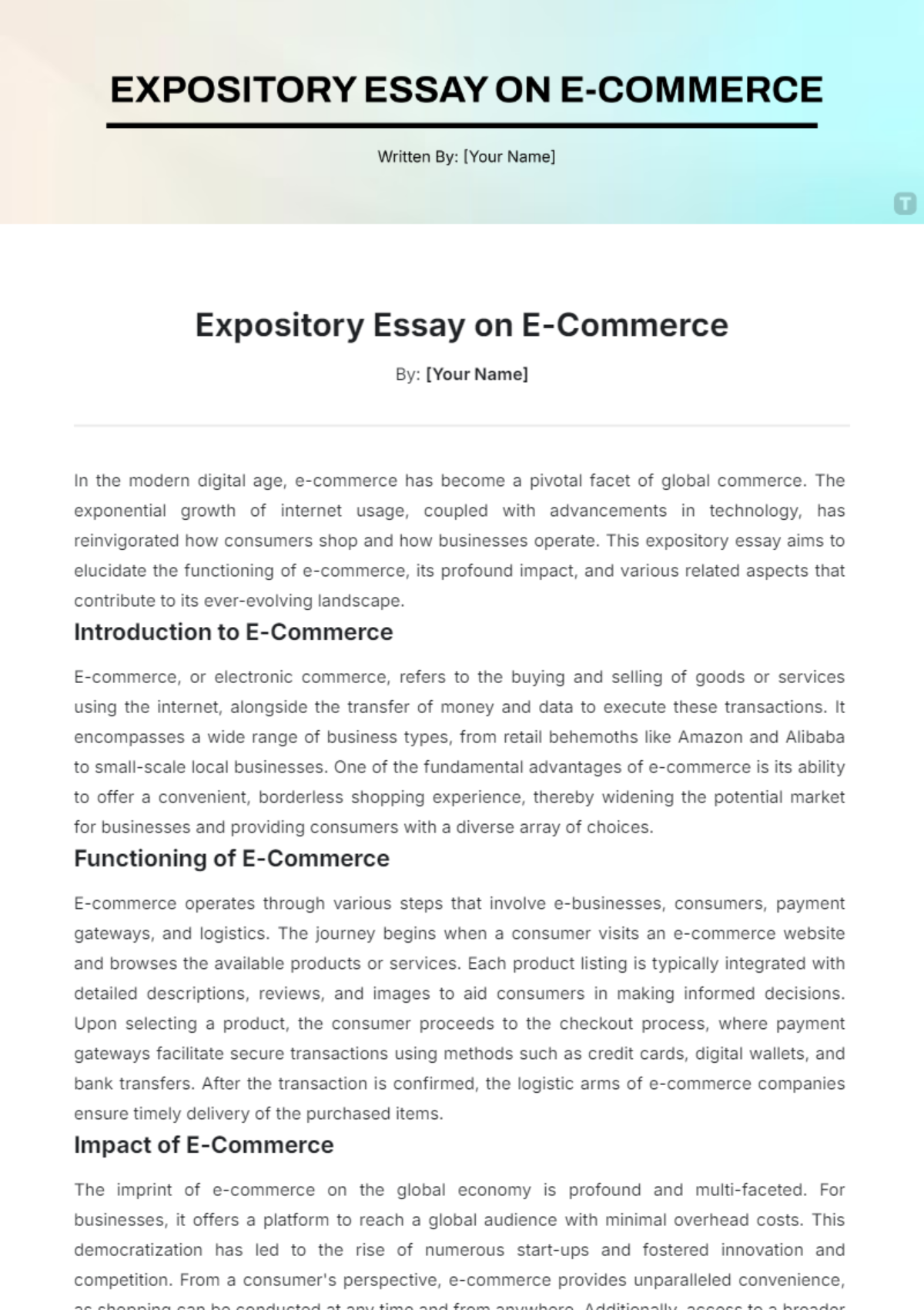Expository Essay on E-Commerce
By: [Your Name]
In the modern digital age, e-commerce has become a pivotal facet of global commerce. The exponential growth of internet usage, coupled with advancements in technology, has reinvigorated how consumers shop and how businesses operate. This expository essay aims to elucidate the functioning of e-commerce, its profound impact, and various related aspects that contribute to its ever-evolving landscape.
Introduction to E-Commerce
E-commerce, or electronic commerce, refers to the buying and selling of goods or services using the internet, alongside the transfer of money and data to execute these transactions. It encompasses a wide range of business types, from retail behemoths like Amazon and Alibaba to small-scale local businesses. One of the fundamental advantages of e-commerce is its ability to offer a convenient, borderless shopping experience, thereby widening the potential market for businesses and providing consumers with a diverse array of choices.
Functioning of E-Commerce
E-commerce operates through various steps that involve e-businesses, consumers, payment gateways, and logistics. The journey begins when a consumer visits an e-commerce website and browses the available products or services. Each product listing is typically integrated with detailed descriptions, reviews, and images to aid consumers in making informed decisions. Upon selecting a product, the consumer proceeds to the checkout process, where payment gateways facilitate secure transactions using methods such as credit cards, digital wallets, and bank transfers. After the transaction is confirmed, the logistic arms of e-commerce companies ensure timely delivery of the purchased items.
Impact of E-Commerce
The imprint of e-commerce on the global economy is profound and multi-faceted. For businesses, it offers a platform to reach a global audience with minimal overhead costs. This democratization has led to the rise of numerous start-ups and fostered innovation and competition. From a consumer's perspective, e-commerce provides unparalleled convenience, as shopping can be conducted at any time and from anywhere. Additionally, access to a broader market often translates into more competitive prices and a wider array of products.
E-commerce has also catalyzed significant changes in traditional retail models. Brick-and-mortar stores increasingly integrate online shopping functionalities to stay relevant, while others have transitioned entirely to e-commerce platforms. On a broader scale, the logistics and supply chain industry has undergone a revolution to keep pace with the demands of e-commerce, leading to advancements in areas like last-mile delivery and inventory management systems.
Related Topics and Future Directions
The scope of e-commerce is vast and intersects with various technological, economic, and social factors. Key topics include cybersecurity, as ensuring safe transactions and protecting consumer data are paramount. Additionally, the rise of mobile commerce or m-commerce highlights the growing trend of consumers making purchases via smartphones and tablets. Another significant area is the use of big data and artificial intelligence to personalize shopping experiences and optimize business operations.
Looking ahead, the e-commerce landscape is expected to continue its rapid evolution. Innovations like augmented reality (AR) and virtual reality (VR) are likely to enhance the online shopping experience, providing immersive ways to try products before purchase. Blockchain technology also holds potential for introducing more secure and transparent transaction methods. Ultimately, the future of e-commerce will be shaped by continuous advancements in technology and shifting consumer preferences.
Conclusion
E-commerce has unequivocally transformed the way commerce is conducted globally. By offering convenience, variety, and competitive pricing, it has reshaped consumer behavior and compelled businesses to adopt innovative practices. As technologies advance and markets evolve, e-commerce is poised to remain at the forefront of global trade, continuously redefining the paradigms of buying and selling. Understanding its mechanisms and impacts is essential for both consumers and businesses navigating the digital market landscape.
Essay Templates @ Template.net






























